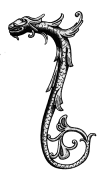John Milton
The
lasting and over-riding
image we get from the Bible is of the
serpent that
tempted Eve in the garden of Eden,
which caught the imagination of a number of poets and
writers.
Here is John Milton (1608 – 1674)
from Paradise Lost (Book I, line 34):
Say first, for
Heav’n hides nothing from thy view
Nor the deep Tract of Hell, say first what cause
Mov’d our Grand Parents in that happy State,
Favour’d of Heav’n so highly, to fall off
From their Creator, and transgress his Will
For one restraint, Lords of the World besides?
The infernal serpent; he it was, whose guile,
Stirr’d up with envy and revenge, deceiv’d
The mother of mankind.
Thomas Moore
The idea that the
serpent thus represents the evil in the world appears again and again.
Here is a couplet from Thomas Moore (1779 – 1852), in Lalla Rookhh--Paradise
and the Peri:
Some flow'rets of Eden ye still inherit,
But the trail of the serpent is over them all.
And again from 'The Fireworshippers' in
Lalla Rookh:
Light as the angel shapes that bless
An infant's dream, yet not the less
Rich in all woman's loveliness;--
With eyes so pure that from their ray
Dark Vice would turn abasht away,
Blinded like serpents when they gaze
Upon the emerald's virgin blaze;
Yet filled with all youth's sweet desires,
Mingling the meek and vestal fires
Of other worlds with all the bliss,
The fond, weak tenderness of this:
A soul too more than half divine,
Where, thro' some shades of earthly feeling,
Religion's softened glories shine,
Like light thro' summer foliage stealing,
Shedding a glow of such mild hue,
So warm and yet so shadowy too,
As makes the very darkness there
More beautiful than light elsewhere.

Percy Bysshe Shelley
A short poem entitled The Serpent:
Wake the serpent not - lest he
Should not know the way to go -
Let him crawl which yet lies sleeping
Through the deep grass of the meadow!
Not a bee shall hear him creeping,
Not a may-fly shall awaken
From is cradling blue-bell shaken,
Not the starlight as he's sliding
Through the grass with silent gliding.
